Gaza deaths pass 200 as Israel and Hamas trade fire
- Published
Lyse Doucet's report from July 2014 on the beach deaths in Gaza
The death toll from Israeli air strikes in Gaza has passed 200, as militants and Israel have traded rocket and missile fire for a ninth day.
In the latest Palestinian casualties, four children were killed in an Israeli strike on a beach near Gaza City.
Hamas and other militants have fired more rockets after an initial Egyptian attempt to broker a ceasefire failed.
Hamas, which dominates Gaza, formally confirmed on Wednesday that it had rejected the initiative.
Israel - which initially endorsed the plan on Tuesday - later resumed air strikes amid continuing rocket fire from Gaza.
Palestinian officials say at least 10 people were killed in pre-dawn Israeli raids on Wednesday. They say at least 213 people have been killed since the start of the violence last week.
Israeli Prime Minister Benjamin Netanyahu said Hamas had "shut the door to a diplomatic solution" and bore "sole responsibility for the continuation of the violence".
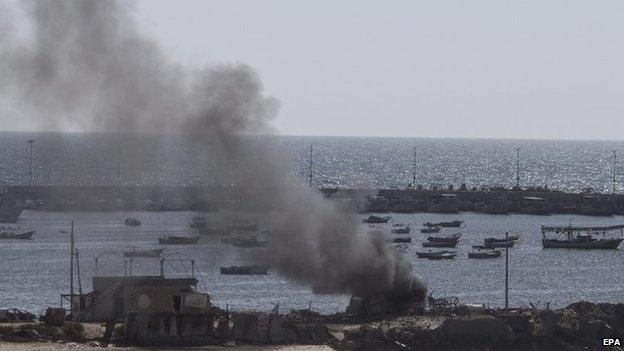
The Gaza City port was among the targets of Israeli strikes on Wednesday
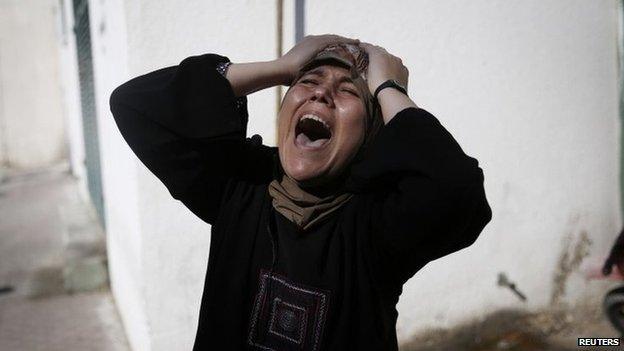
Relatives of the children killed on the Gaza beach were distraught
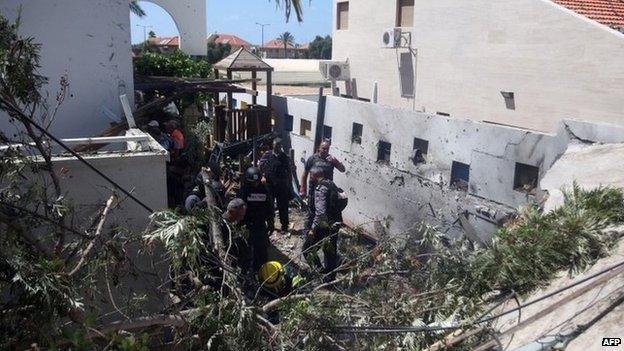
Militants fired rockets at Israeli cities - including Ashkelon
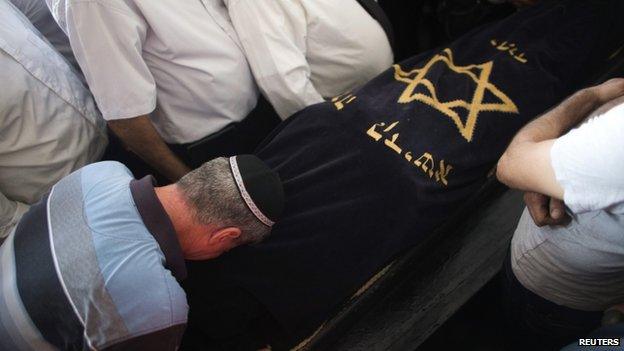
Relatives buried the first Israeli national killed by a Palestinian rocket during the conflict

Yolande Knell, BBC News, Gaza
We heard loud thuds by the coast and saw smoke rise behind a beachside hotel used by journalists. The boys who were killed were from a family of fishermen who work in the nearby port. It's understood that they were playing by a shipping container. Witnesses said the site was hit twice.
Hamas described the attack as a war crime, and called for the United Nations to condemn it. Israel's military says it's investigating what happened. It often targets open areas by the sea which are used by militants to launch rockets into its territory.
Health officials here say 213 Palestinians have been killed in the past nine days. Earlier, in Israel, there was a funeral for the first Israeli civilian killed in this conflict. He was hit by a mortar shell fired from Gaza near the northern border with Israel.

Kevin Connolly, BBC Middle East correspondent, Jerusalem
Israel has acknowledged that at least one attack which caused civilian casualties earlier in this conflict was a tragedy - and while it will argue that such incidents take time to investigate, it may do so again.
But its underlying position does not change. It blames Hamas for civilian fatalities and injuries at two levels. First, it says Hamas bears overall responsibility for the flare-up of hostilities and second, it argues that the Israeli armed forces go to great length to avoid civilian casualties.
It says Palestinian militants use their own people as human shields. Palestinians don't accept any of that. They point angrily to the civilian death toll and feel they are being subjected to brutal collective punishment.
Israel takes every opportunity to make its case to the international community. By accepting the first Egyptian ceasefire proposal, when Hamas did not, it believes it has the political and diplomatic high ground. Attempts to broker a ceasefire may go on - but so does the fighting.

Meanwhile, Gaza militants fired dozens of rockets into Israel on Wednesday.
Senior Hamas official Sami Abu Zuhri told reporters on Wednesday that the group did not accept Egypt's ceasefire proposal and that Israel would pay a heavy price for its strikes.
Are Israeli air strike warnings effective? The BBC examines footage from both sides
Hamas - designated a terrorist organisation by Israel and the US, among others - is demanding the easing of border closures in Gaza and the release of Hamas prisoners.
'No options'
The Israel Defense Forces (IDF) says its Iron Dome missile shield shot down 23 rockets launched from Gaza on Wednesday, while others struck without causing casualties.
A spokesman for the Egyptian foreign ministry told the BBC that it would continue talking to all the parties. "We have no other option," he said.
The BBC's James Reynolds assesses the mood in the Israeli city of Ashkelon
The BBC's Yolande Knell in Gaza says there's growing concern of an even wider military offensive
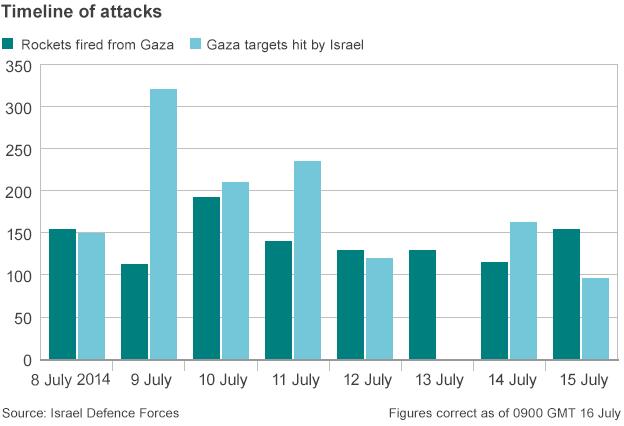
Israel's stated aim in its Operation Protective Edge is to halt Palestinian rocket attacks, but the United Nations says the majority of those killed in Gaza have been civilians.
Mr Netanyahu has come under criticism in Israel for accepting the truce initiative. His office announced that deputy defence minister Danny Danon had been sacked for comments branding the PM a "failure".
Israel has mobilised tens of thousands of troops on the border with Gaza amid speculation a ground invasion could be launched.
The UN says at least 1,370 homes have been destroyed in Gaza and more than 18,000 people displaced in recent hostilities.

Are you in the area? Please get in touch by emailing Haveyoursay@bbc.co.uk, external putting the word 'Gaza' in the subject heading.